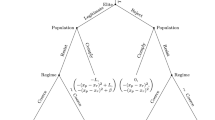Abstract
In weak institutional settings, autocrats barter political and economic concessions for support to remain in power and extract rents. Instead of viewing the favors’ beneficiaries, i.e. the elites, as an exogenous entity, we allow the king to decide whom to coopt provided the subjects are heterogeneous in the potential support—their strength—they could bring to the regime. While the ruler can select the elites on the basis of their personal characteristics, an alternative strategy consists in introducing some uncertainty in the cooptation process. The latter strategy allows the king to reduce the clients’ cooptation price since in the event of a revolution the likelihood of being included in the future body of elites is lower. We show that weak rulers are more likely to coopt the society’s strongest individuals, while powerful rulers diversify the composition of their clientele. Moreover, when agents value more future discounted outcomes, the king is more likely to randomly coopt subjects.
Similar content being viewed by others
References
Acemoglu D, Robinson J (2000) Why did the west extend the franchise? Democracy, inequality, and growth in historical perspective. Q J Econ 115(4): 1167–1199
Acemoglu D, Johnson S, Robinson J (2001) The colonial origins of comparative development: an empirical investigation. Am Econ Rev 91(5): 1369–1401
Acemoglu D, Robinson J, Verdier T (2004) Kleptocracy and divide-and-rule: a model of personal rule. J Eur Econ Assoc Pap Proc 2: 162–192
Acemoglu D, Egorov G, Sonin K (2008) Coalition formation in non-democracies. Rev Econ Stud 75: 987–1009
Azam JP (1995) How to pay for the peace? A theoretical framework with references to african countries. Public Choice 83: 173–184
Bar-El R (2009) Dictators, development, and the virtue of political instability. Public Choice 138: 29–44
Belova E, Gregory P (2009) Political economy of crime and punishment under stalin. Public Choice 140: 463–478
Bertocchi G, Spagat M (2001) The politics of co-optation. J Comp Econ 29(4): 591–607
Blau PM (1964) Exchange and power in social life. Wiley, London
Bueno De Mesquita B, Morrow J, Siverson R, Smith A (2002) Political institutions, policy choice and the survival of leaders. Br J Political Sci 32: 559–590
Bueno De Mesquita B, Morrow J, Siverson R, Smith A (2003) The logic of political survival. The MIT Press, Cambridge
Cervellati M, Fortunato P, Sunde U (2008) Hobbes to rousseau: inequality, institutions, and development. Econ J 18: 1354–1384
Cohen S (1979) The friends and foes of change: reformism and conservatism in the soviet union. Slav Rev 38(2): 187–202
Diermeier D, Fong P (2009) Legislative bargaining with reconsideration. Concordia University, Mimeo
Egorov G, Sonin K (2009) Dictators and their viziers: endogenizing the loyalty-competence trade-off. J Eur Econ Assoc (forthcoming)
Ekeh P (2004) Individuals’ basic needs & the limits of democratization in Africa, chap 2. In: Berman B, Eyoh D, Kymlicka W (eds) Ethnicity & democracy in Africa. James Currey and Athens: Ohio University Press, Oxford, pp 22–37
Fudenberg D, Tirole J (1991) Game theory. MIT Press, Cambridge
Gandhi J, Przeworski A (2006) Cooperation, cooptation, and rebellion under dictatorships. Econ Politics 18: 1–26
Gershenson D, Grossman HI (2001) Cooption and repression in the Soviet Union. Econ Politics 13: 31–47
Grossman H (1999) Kleptocracy and revolutions. Oxf Econ Pap 51(2): 267–283
Hanley E, Yershova N, Anderson R (1995) Russia-old wine in new bottle? The circulation and reproduction of russian elites, 1983–1993. Theory Soc 24: 639–668
Homans GC (1961) Social behavior: its elementary forms. Harcourt, Brace & World, New York
Jackson RH, Rosberg CG (1984) Personal rule: theory and practice in Africa. Comp Politics 16(4): 421–442
Kirstein R, Voigt S (2006) The violent and the weak. When dictators care about social contracts. Am J Econ Sociol 65(4): 863–889
Konrad K, Leininger W (2007) Self-enforcing norms and the efficient non-cooperative organization of clans. CEPR Discussion Paper No. DP6333
Kryshtanovskaya O, White S (1996) From soviet nomenklatura to russian elite from soviet nomenklatura to russian élite. Eur Asia Stud 48(5): 711–733
Lazarev V (2005) Economics of one-party state: promotion incentives and support for the soviet regime. Comp Econ Stud 47(2): 346–363
McGuire MC, Olson M, Martin C (1996) The economics of autocracy and majority rule. J Econ Lit 34: 72–96
North D, Weingast B (1989) Constitutions and commitment: evolution of institutions governing public choice. J Econ Hist 49(4): 803–832
North D, Wallis J, Weingast B (2009) Violence and social orders: a conceptual framework for interpreting recorded human history. Cambridge University Press, New York
Olson M (1993) Dictatorship, democracy, and development. Am Political Sci Rev 87(3): 567–576
Padró-I-Miquel G (2007) The control of politicians in divided societies: the politics of fear. Rev Econ Stud 74(4): 1259–1274
Platteau JP (1995) An indian model of aristocratic patronage. Oxf Econ Pap 47(4): 636–662
Platteau JP, Sekeris P (2010) On the feasibility of power and status ranking in traditional setups. J Comp Econ 28(3): 267–282
Solzhenitsyn A (1973) The gulag archipelago. Harper and Row, New York
Wintrobe R (1998) The political economy of dictatorships. Cambridge University Press, Cambridge
Wintrobe R (2001) How to understand, and deal with dictatorship: an economist’s view. Econ Goverance 2: 35–58
Author information
Authors and Affiliations
Corresponding author
Additional information
This work was supported by a grant from the Inter-university Attraction Pole (IAP) program funded by the Belgian Federal Science Policy Office.
Rights and permissions
About this article
Cite this article
Sekeris, P.G. Endogenous elites: power structure and patron-client relationships. Econ Gov 12, 237–258 (2011). https://doi.org/10.1007/s10101-010-0093-8
Received:
Accepted:
Published:
Issue Date:
DOI: https://doi.org/10.1007/s10101-010-0093-8




